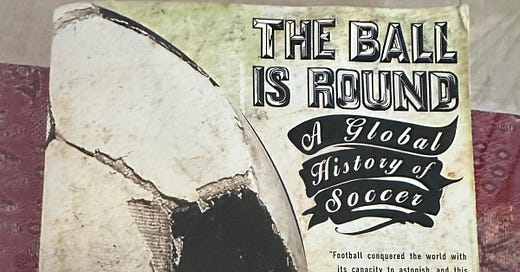Summer reading: The brilliance of David Goldblatt
Four books of Goldblatt's we highly recommend for any soccer fans
Perhaps the best storyteller and incomparable researcher of football David Goldblatt, has several books worth checking out.
The Ball is Round (2007) is an incomparable sweeping, if fairly basic history of the game from its origins to the heights of the late 20th Century. Goldblatt discusses each corner of the globe and the development of the game. For many readers, this book was a proper introduction to the sport outside Europe or Latin America.
Goldblatt places special emphasis on the game's working class roots and discusses at length the transformation of the sport into an economic phenomena that attracts interest from the world’s plutocrats and various nation-states.
In the runup to the 2014 World Cup he published Futebol Nation For a nation of its size and stature, Brazil has been an underachiever in everything Goldblatt argues with one exception – football.
It’s well known that Brazil is rife with corruption in its political and business life, a infamously seedy underworld, industry that has decayed to the point of disappearance, historic racism and a lack of national unity or purpose. Goldblatt paints this very familiar (and somewhat stereotypical) picture of Brazil but discusses how one thing has created a sense of nationhood and purpose- football.
The book can be very depressing at times. Goldblatt discusses at length how the sport through the years was so popular it proved to be a forum for those seeking power and those in politics to manipulate the electorate. He also demonstrates how businessmen used the sport to exploit workers regularly and play on their love of the sport. He also shows how Brazil’s football authorities have engaged in the sort of misconduct that might not be tolerated in other walks of life.
Brazilian football was rife with players who were alcoholics or were womanizers playing for owners who were schemers or quick buck con artists. Goldblatt describes the difficulty smaller clubs have in the league as the institutional structures of the game and tolerance of corruption favor big clubs in big cities.
As the world now knows, the 2014 FIFA World Cup led to an increased exploitation and misuse of public money by Brazilian Government and officials who govern football in that nation. Goldblatt was quite possibly the first western journalist to tell the complete story of the misappropriation of funds, the cost overruns, the unbuilt or unfinished stadiums and the decaying infrastructure around the stadiums.
Following the 2014 FIFA World Cup Goldblatt turned his attention to something that has transformed football. This was the emergence of the game and the (English) Premier League as a global window to the new more urbane and sophisticated Britain, coming out of the “Cool Britannia” era in the 1990’s.
In this masterwork, Goldblatt has woven a motif of societal change, politics and geography into one work about the sport.
The changes in English society throughout the Thatcherite 1980s as well as the struggles between the industrial north and London are covered in vivid and great detail. How these changes led to the Premier League we know today and the dominance of the domestic game by clubs from London and Manchester is a critical element of the book.
Goldblatt describes how Manchester, unlike other northern English cities, was able to emerge in a service-based economy as a global city. This fueled an interest in football and ultimately attracted both the Glazers and the Abu Dhabi royals to buy football clubs in the city.
The accumulation of wealth and global relevance of London allowed clubs from the capital, who long played second-fiddle in the domestic game, to emerge as titans while their rivals to north outside Manchester all fell off from the heights of the past. Since the publication of the book, Crystal Palace and Brentford, two historic also-rans have become Premier League fixtures, while some of the north’s most decorated historic clubs have wallowed, lurching from one economic crisis to another.
Pre-1992, English struggles with racism, sexism and homophobia are discussed by Goldblatt. For years, soccer served as a sanctuary for those with racist views and also for right-wing groups. The 1980’s were a horrible time in large portions of the UK and football in particular reflected this strife. While in some parts like Liverpool, football became a way to rally against the government, something still often seen in Everton and Liverpool in much of the rest of the nation it became an angry, dirty game.
Despite the commercialization of the Premier League, Goldblatt argues the league emerged from that period stronger and more inclusive thanks to the global interest and audience.
Political discussions between Thatcherism, as represented by the Tories, and Labour are intertwined extensively in every part of the book. Without understanding the political culture of the UK and the changes brought to the country by Margaret Thatcher, it is probably impossible to completely appreciate this work, or the trajectory of English football in general.
The Game of Our Lives, does an amazing job of weaving societal and political considerations to create a readable history of how football in England evolved from the 1980’s to the mid 2020’s.
In 2020, Goldblatt updated the Ball is Round with what is effectively a second volume, The Age of Football. This book picks up in the 21st Century, not only focusing on the growing commercialism of the sport but how football has become a protest mechanism against the worst dictatorships in the world. It also discusses the growth of the sport in China and India and how that might impact the game’s future.
All four of these books are very worthwhile reads.





You are correct, Kartik.
These are some of the best books about football and it role in society.